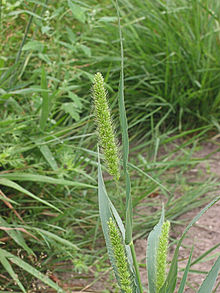강아지풀
Jump to navigation
Jump to search
Korean[edit]

Etymology[edit]
First attested in the Bullyu dugongbu si eonhae (分類杜工部詩諺解 / 분류두공부시언해), 1481, as Middle Korean ᄀᆞ〮랏 (Yale: kólàs). The underlying form was almost certainly ᄀᆞ랒 (Yale: kolac). The Middle Korean term meant weeds in general, not foxtail millets specifically.
The suffix -이 (-i) was applied to the Middle Korean form in the seventeenth century, ultimately producing the form 가라지 (garaji) by the eighteenth century. This form differed from the word 강아지 (gang'aji, “puppy”) by only one consonant, and the foxtail strongly resembles an animal's furred tail (hence also the English name). Nineteenth-century speakers hypercorrected 가라지 (garaji) accordingly, producing the modern form 강아지 (gang'aji, “puppy”) + 풀 (pul, “grass”).
Pronunciation[edit]
- (SK Standard/Seoul) IPA(key): [ka̠ŋa̠d͡ʑipʰuɭ]
- Phonetic hangul: [강아지풀]
| Romanizations | |
|---|---|
| Revised Romanization? | gang'ajipul |
| Revised Romanization (translit.)? | gang'ajipul |
| McCune–Reischauer? | kangajip'ul |
| Yale Romanization? | kangaci.phul |
Noun[edit]
강아지풀 • (gang'ajipul)
References[edit]
- 황선엽 (Hwang Seon-yeop) (2009) “'강아지풀'의 어휘사 [A lexical history of gang'aji-pul]”, in Han'gugeohak, volume 45, pages 421–446